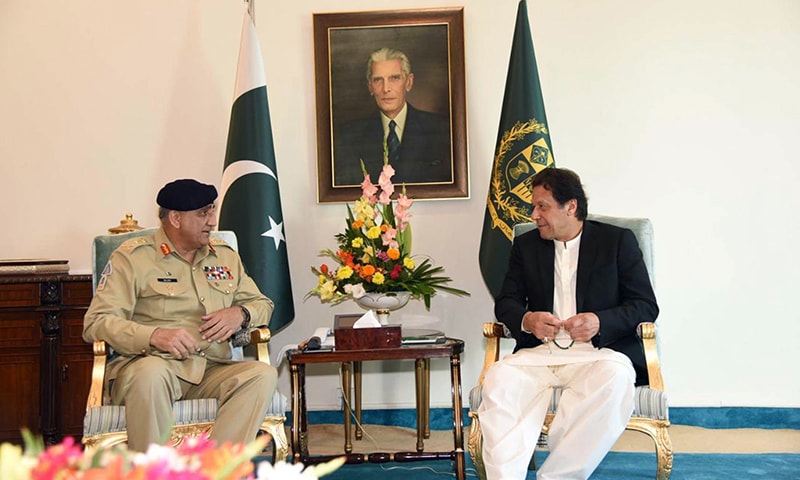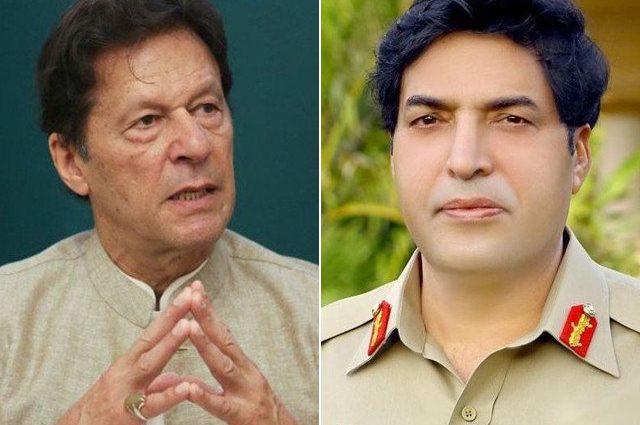A final round of consultation was held between the Prime Minister and Chief of Army Staff today.
During this process a list of officers was received from ministry of Defence. Prime Minister interviewed all the nominees.
It never happened in the past that any serving general was interviewed by the PM before being appointed DG ISI.
ISLAMABAD ( Web News )
Chief of Army Staff General Qamar Javed Bajwa called on Prime Minister Imran Khan today.
The meeting was part of the ongoing consultation process between the Prime Minister and Chief of Army Staff about the timing of change of command in ISI and selection of the new DG ISI.
During this process a list of officers was received from ministry of Defence. Prime Minister interviewed all the nominees. A final round of consultation was held between the Prime Minister and Chief of Army Staff today. After this detailed consultative process, name of Lt. Gen. Nadeem Anjum was approved as new DG ISI.
The designate DG ISI shall assume charge on 20th November, 2021. Although the prime minister finally picked the same general, who was named as new spymaster in October 6 press release of military’s media wing, he has set a new precedent for the appointment of DG ISI in the future. It was for the first time that the prime minister interviewed potential candidates before finalising the name of new spy chief sent by the Ministry of Defence.
Since 2000, it was only in 2012 when the announcement of new DG ISI came from the PM office and even that too was terse statement making no mention of either the interviews or consultations with the army chief. On all other occasions the announcement of ISI Chief was made by ISPR, military’s media wing.

In fact last two appointments during the current government also came from the ISPR. But only this time PM Imran objected to the past practice and insisted that he would make the final call, triggering an unprecedented standoff between the civil and military leadership who previously claimed to be on the same page.
The deadlock seemed to have broken after both sides reached a compromise. While the prime minister agreed to stick with the army chief’s nominee for the coveted slot, the chief of army staff conceded that authority to appoint the DG ISI rested with the premier.
PM Imran also managed to prevail upon the army chief as far as interviewing the candidates for the ISI chief slot was concerned. It never happened in the past that any serving general was interviewed by the PM before being appointed DG ISI.
Prime Minister Imran also made clear he was the final authority to decide when the incumbent would relinquish the office and new one take over.
As per the October 6 official statement of the ISPR the new DG ISI was supposed to take charge immediately but the notification now issued by the PM Office stated that the incumbent would continue as country’s spymaster till November 20.
A notification issued by the PM Office on Tuesday said: “The Prime Minister has seen and approved the appointment of Lt Gen Nadeem Ahmed Anjum, HI (M) as Director General Inter-Services Intelligence, with effect from November 20, 2021”.
The notification added that the incumbent spymaster, Lt Gen Faiz Hameed “shall continue to hold charge as the Director General Inter-Services Intelligence till November 19, 2021”.
The development came after Chief of Army Staff General Qamar Javed Bajwa called on PM Imran.
“The meeting was part of the ongoing consultation process between the Prime Minister and Chief of Army Staff about the timing of change of command in ISI and selection of the new DG ISI,” PM Office said in a statement.
During this process a list of officers was received from Ministry of Defence. The prime minister interviewed all the nominees. A final round of consultation was held between the prime minister and the army chief earlier today.
“After detailed consultative process, name of Lt Gen Nadeem Anjum was approved as new DG ISI,” the statement said adding that the designate DG ISI shall assume charge on November 20, 2021.
The ISI is a premier Intelligence agency of Pakistan tasked to deal with internal and external threats. Theoretically, its head reports to the prime minister.

